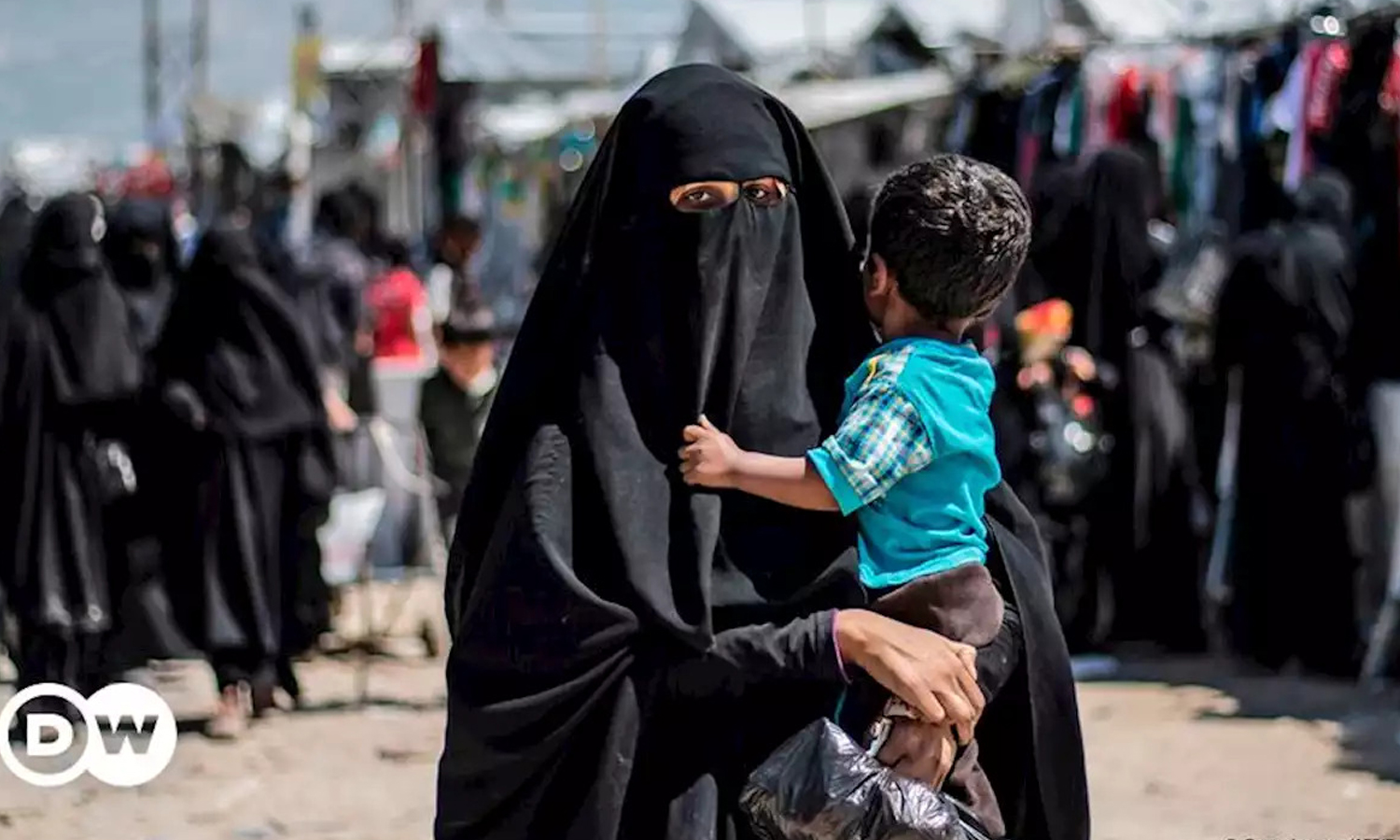



Raqqa- Hussam al-Omar
Trapped with grief, Nusaiba Mohammed watches her five-year-old Bashir and six-year-old Mustafa playing in front of the family’s home in the Old Mosque district in the northeastern city of Raqqa.
Bashir and Mustafa are still unregistered even though the father’s identity is known.
Nusaiba, 28, gave birth to her two children after marrying Tunisian jihadist, who was later killed in Raqqa battles in 2017 when the IS-proclaimed capital of the Islamic caliphate fell to US-backed Syrian Democratic Forces (SDF).
Tens of Raqqa women got married from Islamic State (IS) jihadists during the period of IS dominance, the unknown-future marriages left hundreds of children unregistered in the Syrian official civil records.
According to the Syrian Personal Status Law promulgated by Legislative Decree No. 26 of 2007, a non-registered person is defined as a person whose father or parents are registered in the Syrian civil records, or originally belongs to the Syrian Arab Republic, and was not registered within the specified period of registration in the civil registry records, That is, within 30 days of the occurrence of the birth event.
Nusaiba has not been able to register her two children in the official records of the Syrian regime or even the Kurdish Autonomous Administration, which has controlled Raqqa for five years.
The reason behind registry denial is that the father is a “Muhajer,” which means an IS member of foreign nationality.
Nusaiba shares the same story with other women in Raqqa. Enab Baladi was not able to obtain an official statistic on their number or the number of their children, but according to what the residents of the area said, it is an existing social situation that worsens every day as these children age.
According to an opinion poll set by Enab Baladi in the Raqqa region, the reasons that prompted families to engage in such marriages were related to the high dowry that IS militants offered to girls’ families or guardians or the fear from the influence of the hisbah members.
The hisbah units are patrols from IS members (males and females) who roam the streets to uphold community morals and arrest infringers of sharia, according to locals.
The problem of non-registered children resulted from births of marriages that took place outside the areas controlled by the Syrian regime and were not registered in the civil registers because Article 28 of the Personal Status Law requires that the marriage be registered before the birth.
Having non-registered children listed in the civil status records is the first step to preserve their civil rights, most notably the right to a decent life, education, health, and the completion of government transactions without any problem.
Fatima al-Farhan, 30, registered her six-year-old child in the name of her second husband, whom she married about three years ago. The father of the child was a Libyan IS jihadist who was killed in Raqqa battles.
Al-Farhan told Enab Baladi that she persuaded her new husband to register the child on his name in the official records, even though her family and even her husband’s family were rejecting this step.
After the Autonomous Administration of North and East Syria (AANES) took control of the city of Raqqa, in late 2017, the administration opened its own-style Civil Registry department in the city, allowing families to confirm their marriage and register children.
Despite the move, some families in Raqqa resorted to institutions affiliated with the Syrian regime to register their children due to the lack of official recognition by AANES. Enab Baladi highlighted this case in a previous report.
Syrian laws grant a child born to a Syrian mother and a foreign father the right to obtain Syrian citizenship, thus be registered in the personal status departments, and civil records, human rights advocate and lawyer Mohammed Ayoub told Enab Baladi.
The lawyer pointed out that the marriage of a Syrian mother to a “Muhajer” father is not recognized, according to the laws in force in Syria, because the father entered Syrian territory illegally. Therefore, the mother does not have the right to register her children in the official records and attribute them to the father.
According to Ayoub, the mother has only one option: to register the children under her name, in which case the child becomes of unknown parentage.
He added that children’s non-registration is a dangerous matter that brings serious consequences because they were born in Syria and will certainly grow up on its soil.
The Syrian Nationality Law forbids the mother from giving her nationality to her children, except in the absence of a legal connection to the father, as stipulated in Article “3/b” of Legislative Decree No. 276 of 1969.
Nationality is granted to children born out of marriage or rape, but this provision is rarely relied upon due to stigma and social ostracism.
Also, the guardianship of the mother over her children in the Personal Status Law (amended) is only possible when the husband chooses her as a guardian for them, as stated in Article “167/2”, which stipulates that “guardianship of the funds of minors after the father’s death is for the guardian whom the father chose, though not related to them.”
Many Syrian families face challenges related to the loss of identification documents or their inability to record all changes in their civil records during displacement or forced displacement in the official records.
The regime’s loss of control over large areas and the destruction or closure of civil registry departments outside its regions has caused many difficulties for these families.
The challenges are not limited to improving the conditions of children who are not registered so that they can obtain an education, health service, and dignified life, but rather extend to problems that fall into the mechanism of preserving their right to own property discussed by Enab Baladi in a detailed article entitled “Waiting for the legal birth: Maktumeen in Syria deprived of ownership rights.”
if you think the article contain wrong information or you have additional details Send Correction